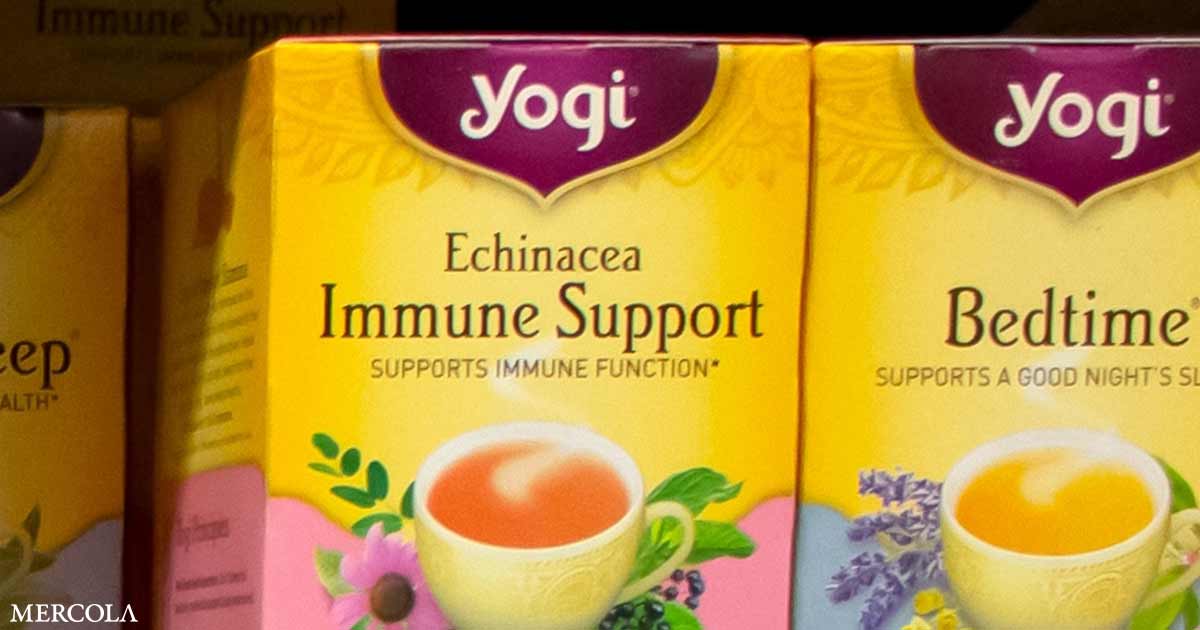East West Tea Company, makers of Organic Yogi Echinacea Immune Support tea, recalled nearly 900,000 bags of the tea due to pesticide concerns. Yogi said in a statement that the traces of pesticides were detected during routine audit procedures and, while they don’t pose a risk to human health, are not up to the company’s quality standards.1
According to the U.S. Food and Drug Administration (FDA), East West Tea Company initiated a voluntary recall on the tea on March 12, 2024 “because pesticide residues were detected above action levels.”2 Although the recalled tea is certified organic, the pesticide contamination highlights the challenges of maintaining the purity of organic products throughout the supply chain.
Organic Yogi Tea Recalled Due to Pesticide Contamination
More than 54,000 boxes of Organic Yogi Echinacea Immune Support tea, which were distributed across the U.S., have been recalled. The boxes were sold in four or six packs, with 16 bags per pack.3
It’s a Class III recall, the least serious type, indicating that the use of or exposure to the product is not likely to cause adverse health consequences. As for how the organic products became contaminated, Yogi said in a statement:4
“While Yogi does not use pesticides, buying only to Organic Specifications that do not allow conventional pesticide use, we exist within a complex supply chain network where not everyone values organic practices in the same way that we do. For example, if a neighboring farm is applying pesticides or chemical fertilizers, those applications may drift onto our farmers’ organic land.”
The company is not only working with stores to remove the recalled tea from shelves but also stated, “In addition, we are working with all ingredient vendors to ensure full compliance with our supplier expectations and testing requirements. We also have engaged new partners to add additional testing capabilities across all of our products.”5
Organic Isn’t Always Foolproof — But It Lowers Pesticide Load
Organic tea can end up with pesticide residues due to several factors, including pesticides drifting through the air or running off into water sources, leading to contamination of organic crops. It’s also possible for soil and water sources to be contaminated with pesticide residues from past agricultural practices or from nearby conventional farms. Even with organic farming methods, these contaminants can be absorbed by the plants.
Further, during the processing, packaging or transportation stages, organic products may come into contact with non-organic products. Shared equipment or facilities that are not properly cleaned can also lead to pesticide contamination. Still, while it’s possible for organic food to contain pesticide residues, one of the best ways to lower your exposure to dangerous pesticides in your food is to choose organic or biodynamic varieties.
A study of 4,466 people in the U.S. found that those who “often or always” ate organic had significantly lower levels of pesticide residues compared to those who ate the least amount of organic produce.6 The Harvard scientists also noted:7
“In the general population, low-level pesticide exposure is widespread, and the primary route of exposure is diet, especially intake of conventionally grown fruits and vegetables … Crossover trials have shown that switching from consuming conventionally grown foods to organic foods decreases urinary concentrations of pesticide metabolites, suggesting reduced exposure to pesticides.”
In fact, the No. 1 reason why people choose to purchase organic products instead of conventional is to avoid pesticides and other chemicals not allowed in organics.8 The benefits of not using chemical pesticides cannot be overstated, especially as such chemicals are leading environmental pollutants.
Worldwide, an estimated 7.7 billion pounds of pesticides are applied to crops each year, and that number is steadily increasing,9 even as related problems, like herbicide resistance and widespread water pollution, rise.
What Are the Risks of Pesticide Residues in Your Food?
The FDA didn’t state which pesticides were found in the recalled tea, or at what levels,10 but most pesticides target the nervous and endocrine systems, raising serious risks to human health. According to a review published in Emerging Contaminants:11
“Most pesticides are potentially toxic to human beings resulting in severe health consequences. There is also evidence that parental exposure, as well as, exposure in early life or adolescence could increase the longer-term risks.
Pesticide exposures have been linked to many human diseases such as Alzheimer, Parkinson, amyotrophic lateral sclerosis, asthma, bronchitis, infertility, birth defects, attention deficit hyperactivity disorder, autism, diabetes, and obesity, respiratory diseases, organ diseases and system failures.
People who are exposed to pesticides are at a greater risk to develop various cancers including non-Hodgkin lymphoma (NHL), leukemia, brain tumors, and cancers of the breast, prostate, lung, stomach, colorectal, liver, and the urinary bladder.”
Many pesticides also have estrogenic activity and have been implicated in worsening fertility. For instance, pesticides have been shown to lower sperm count, even down to 0 in adult men.12
A man’s sperm count can recover from pesticide exposure in about three months, provided he stops being exposed. But if a pregnant woman is exposed to pesticides, her unborn son can be affected — and his sperm count will not recover.13 Grandchildren are also affected, as the changes are passed through generations.
A study published in JAMA Internal Medicine also evaluated the influence of factors known to affect reproduction on the reproductive success of 325 women between the ages of 18 and 45 (mean age 35), who underwent in vitro fertilization (IVF).14
Using a U.S. government database listing average pesticide residues on food, the researchers estimated each participant’s pesticide exposure based on their food questionnaires. On average, women with high pesticide exposure ate 2.3 servings per day of fruits, berries or vegetables known to have high amounts of pesticide residue. Those in the lowest quartile ate less than one serving of high-pesticide produce per day.
Compared to women with the lowest pesticide exposure, women with the highest amounts of pesticide exposure had an 18% lower IVF success rate. They were also 26% less likely to have a live birth if they did become pregnant. Using modeling, the researchers estimate that exchanging a single serving of high-pesticide produce per day for one with low pesticide load may increase the odds of pregnancy by 79%, and the odds of having a live birth by 88%.
What Else Could Be Lurking in Your Organic Food?
Contamination of organic food is a harbinger of systemic problems with food production. A revealing example is the contamination of conventionally grown and organic kale with toxic per- and polyfluoroalkyl chemicals (PFAS),15 also known as “forever chemicals” because they’re so persistent in the environment.
Overall, PFAS levels were higher in organic kale samples than conventional samples, likely due to the use of compost made with biosolids in organic food production. Agronomy consultant Sam Knowlton tweeted:16
“One reason the organic kale may have more PFAS than conventional kale is the use of higher rates of compost in organic production. Most compost is poorly made and more of a waste management endeavor than one geared for producing high-quality inoculum/fertilizer.
Often, undesirable materials like biosolids and other toxin-laden industrial waste are composted but not adequately decomposed. Many farms rely on this type of compost because it is cheaper.”
The Organic Materials Review Institute (OMRI) is an international nonprofit organization responsible for determining which products are allowed in organic production and processing.17 Manure is among them,18 but this “natural” fertilizer has a dark side when it’s sourced from concentrated animal feeding operations (CAFOs).
In addition to being contaminated with pathogenic strains of E. coli, avian influenza and salmonella, chicken litter contains antibiotics, pesticide residues and heavy metals,19 along with PFAS. Until CAFO manure is no longer allowed in organics, it’s likely that organic kale and other produce will continue to face a PFAS problem.
Like the problem of drifting pesticides contaminating nearby organic farms, which may have contributed to the organic tea recall, these systemic problems are deeply embedded in industrial agriculture and can lead to contamination among organic foods as well.
Still, choosing organic products for yourself and your family is one of the most proactive measures you can implement to take control of your health. Not only does choosing organic lower your exposure to pesticides but organically grown foods typically contain higher levels of antioxidants than conventionally grown varieties.20
Tips for Choosing High-Quality Tea
As the world’s most-consumed drink other than water, and one of the oldest known,21 tea makes both a healthy and delicious dietary addition. The tea plant Camellia sinensis has been used medicinally for thousands of years, and its polyphenolic compounds may affect glucose metabolism and insulin signaling, along with a host of additional benefits.
For instance, tea, particularly green tea, has been linked with a reduced risk of stroke, diabetes and depression, and improved abdominal obesity and glucose levels.22 And among adults with Type 2 diabetes, higher intake of tea is associated with lower all-cause mortality.23
Even replacing one sugar-sweetened beverage a day with tea led to health benefits, reducing all-cause mortality by 16% and cardiovascular disease mortality by 24%. Replacing one artificially sweetened beverage a day with tea also led to lower all-cause mortality.24
When choosing tea, however, it’s important to choose organic varieties to minimize exposure to pesticides as much as possible. Also choose varieties grown in nonpolluted areas, as tea plants readily absorb lead and fluoride from the soil.
Choosing tea grown in a pristine environment helps ensure that the least amount of fluoride, heavy metals and other toxins from soil and water possible leaches into the leaves. A clean growing environment is essential to producing a pure, high-quality tea.
Further, loose leaf tea may be safer, as tea bags are often made with heat-resistant polypropylene to prevent the bag from breaking apart in hot water. This means tiny pieces of plastic likely end up in your drink.
Paper tea bags are treated with epichlorohydrin, a chemical to prevent tears, which has been found to be a probable human carcinogen. Epichlorohydrin reacts with water to form 3-MCPD, another possible human carcinogen.
One study found that tea drinkers’ daily intake of epichlorohydrin was 55.37 times greater in those using bagged teas than in those using loose teas.25 Rinsing the tea bags, and not steeping for more than two minutes, may decrease some of the exposure, but using organic, loose-leaf tea may provide an overall healthier choice.



